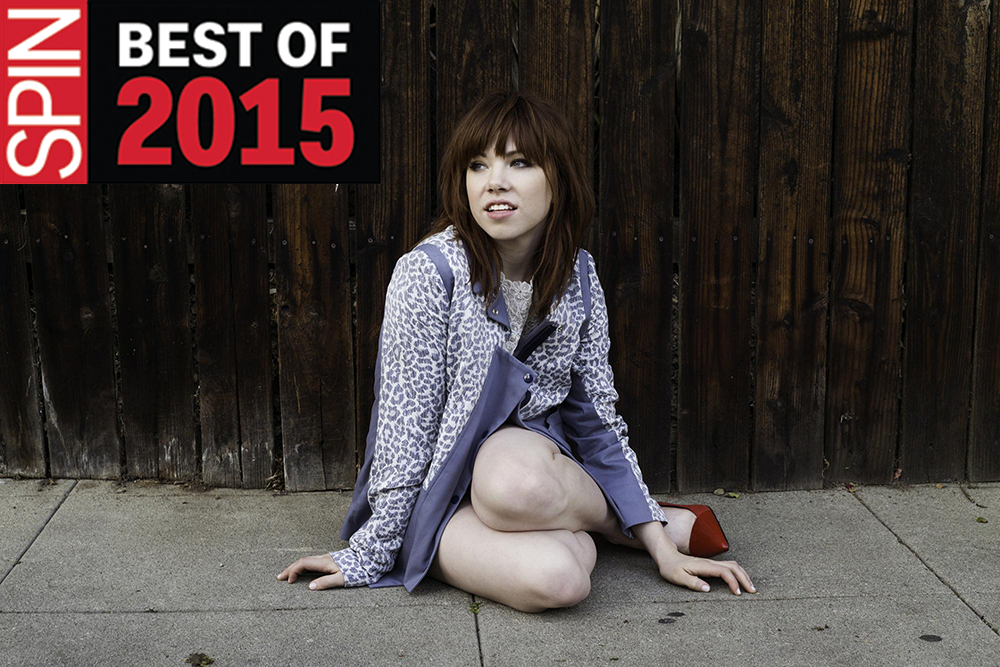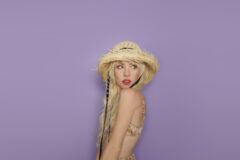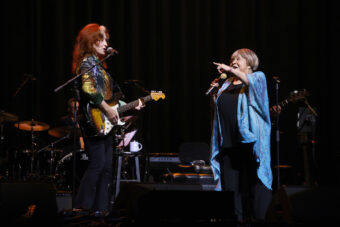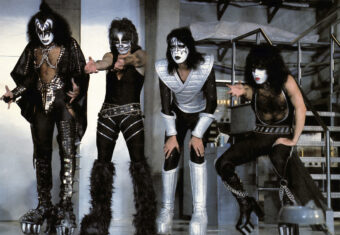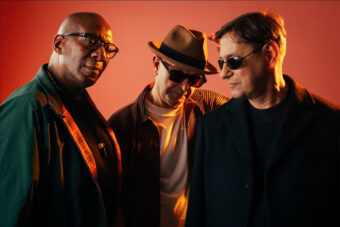At a certain point, Carly Rae Jepsen got sick of “Call Me Maybe,” too. “I was kind of getting tired of hearing my own voice on the radio,” she says, laughing over the phone. Fair enough: The megahit was the best-selling digital single of 2012, topped the Village Voice‘s Pazz & Jop singles poll, and inspired lip-synching homages by Justin Bieber and Selena Gomez, Katy Perry, and the USA Olympic Swimming Team, among many others.
So she took a break, nabbing a lead role on Broadway in 2014’s Cinderella. But it wouldn’t be long before Jepsen felt compelled to write again. With help from co-writers like Shellback, the Cardigans’ Peter Svensson, and Sia, Jepsen compiled more than 200 new songs and whittled them down with alterna-pop producers Dev Hynes, Ariel Rechtshaid, and Vampire Weekend’s Rostam Batmanglij to release a third record, the ebullient E•MO•TION.
Unlike its unfairly dismissed predecessor, Kiss (which sold 292,000 copies as of this past August, a respectable stat until it’s compared to the 7.6 million downloads “Call Me Maybe” racked up), E•MO•TION had critics salivating immediately, leaving them smitten with its ’80s-inspired synth melodies and echoing drum machines. (The 12-track set recently ended up as one of SPIN‘s picks for the 50 Best Albums of 2015.)
Featuring the wink’n’flirt gem “I Really Like You,” the sax-tinged “Run Away With Me,” and the slow burning “All That,” E•MO•TION hasn’t exactly propelled its creator to Taylor Swift-levels of fame, but it has given the 30-year-old the chance to craft sticky songs that not only reflect her personal taste but also leave an imprint on the listener. Below, Jepsen tells SPIN about how she inched away from “Call Me Maybe” and found her voice in 2015.
During your last album cycle, at what point did you decide it was time to step back and reevaluate your approach to music?
I remember [the success of “Call Me Maybe”] being really exciting at first. Then I was like, “Please stop playing that song! I know I’m making money, but please!” I think when the opportunity to go to New York [for Cinderella] came around — which is something I always dreamed of — it seemed like a wonderful opportunity to throw myself into a new world and just take a break from this world. I’m so glad I did, and I’m so thankful for that experience, which gave me natural inspiration and the ability to write from the heart again.
E•MO•TION stands as your most critically acclaimed album to date. Was that the reaction you expected?
I didn’t really have any expectations one way or the other. But it’s been incredible with people talking about it as much as they are. It means so much to me, it really is the best feeling ever; getting so much respect from magazines and such.
When you were in the studio with producers like Ariel Rechtshaid, Dev Hynes, and Rostam Batmanglij, what specifically did you tell them you wanted to achieve with E•MO•TION?
I didn’t want to feel like I had to recreate “Call Me Maybe.” In fact, I think I really shunned anything that would cross into that. The truth of it is, I really love pop music. I think what triggered it for me was a discovery of the ’80s and how emotional and exciting that era of pop was. So when I would get into the studio, I just wanted to recreate ’80s pop. I didn’t want to re-do “Call Me Maybe” — I just wanted us to make music that we love. I think that if there’s even one collaborator who isn’t obsessed with what you’re making, then it’s not going to work. I had to find my people that like the same things that I did, and that took a while. [But] once I found them, they were off to the races.
I heard that you initially wrote more than 200 songs for this album.
Yeah, it was torturous. [Laughs.] I had so many songs that I was in love with. I remember thinking, “Would it be really weird if I came back after two-and-a-half years with a 40-song album?” I think there was a time where there was going to be 22 songs on there, then a time where there was going to be 17. It ended up working out, and I’m absolutely glad that I was made to narrow down. There’s a couple of tunes that I’m excited about and that I would love to do in a different way, but they didn’t make the album because something wasn’t fitting.
The only E•MO•TION criticism I noticed this year was an consensus that “we don’t know who Carly Rae Jepsen is.” Personally, I don’t agree — I think pop critics can be quick to sub the word “personality” in for “controversy.” That said, do you think that a pop singer needs a little controversy around them to be commercially viable?
Oh, I can’t pretend to know the answer to that. I don’t know, I don’t worry about it much. I think I spend my energy thinking about what kind of music I want to make next and how I want the live shows to be. People’s perception of me is never something [I] can control, which is why it’s just as dangerous to read the good reviews as it is to read the bad reviews; you start to actually believe them. I think you just have to get in touch with who you are — I know that I do, I know my friends do. If you listen to my album, my whole heart is on my sleeve right there.
How much does charting factor into your personal idea of success?
I feel like it’s something you can’t control — you never know what’s gonna work. I never would have imagined that [E•MO•TION] would do as well as it did. I was fighting for [“Call Me Maybe”] to not be the first to go out; I liked this other song, “Curiosity.” I remember playing it for my friends and family and getting such a unanimous vote in the other direction that I got this last-minute reaction from my gut that was like, “You can’t ignore this!” I liked the first song too, but it wasn’t my first pick. I never know what the radio will like. I have my friends tell me.
I read in your Rookie interview that you’ve been experimenting with more of a ’70s disco sound lately. Going forward, are you interested in playing around with different eras of pop?
Yeah. I think that’s the gift that E•MO•TION has given me: the freedom to feel like I have my own opinion. Whatever I do next, I feel like I have even more freedom. Some of the experiments on this album, like the collaboration with Rostam Batmanglij from Vampire Weekend [Ed.’s Note: “All That”], ended up being one of the weirder tracks but also one of my favorites at the end of the day. You’re right in noting that I am super-obsessed with disco right now. I don’t know what it is, but I can’t stop listening to it and writing in that sort of format.
When you compare your 2012 to 2015, what comes to mind?
They’re very different, but I absolutely would say that I prefer 2015 and I’m very much looking forward to the years to come. It’s not that 2012 wasn’t good, but it was so intense. I had to get off the roller coaster, get my footing, and make sure that I was making music for the right reasons. It’s more about the music than the celebrity, and it was important to me to get that confidence back. This album helped steer me in the direction of what I want to do next.
What would you like 2016 to look like?
I’m really exciting to tour this album. We’re doing a couple of East Coast shows before the new year. I just want to tour this album as much as I can. The writing process hasn’t stopped; it isn’t like an album beginning-and-end for me, it’s a continuous process. A lot of the beginnings of ideas that made E•MO•TION are songs that I made right after Kiss. The time immediately after releasing an album is always a really prolific time for me, I don’t know why that is, but I’ll just work on figuring out what I’m doing for the next album.
You can enjoy this playlist on the go! Download MixRadio for free here

